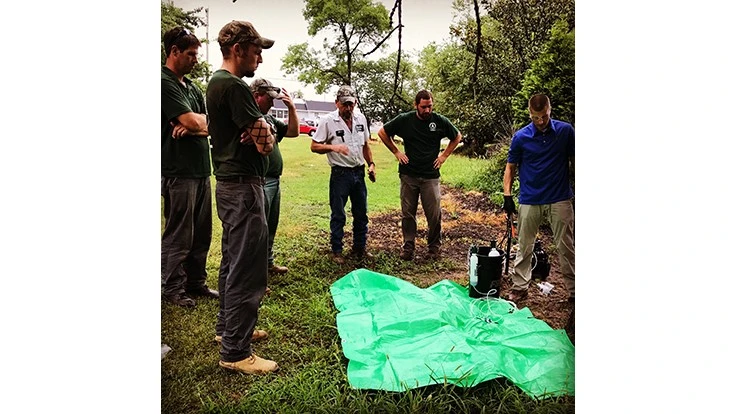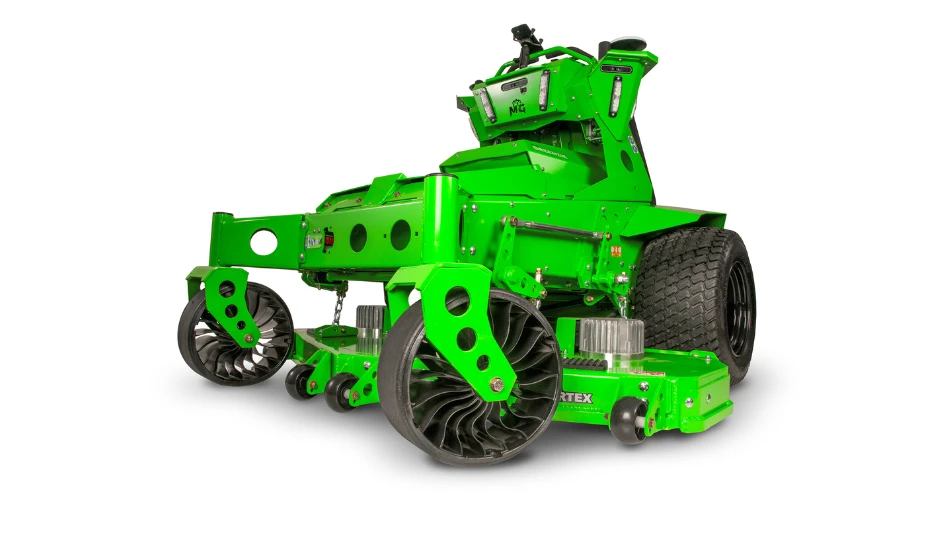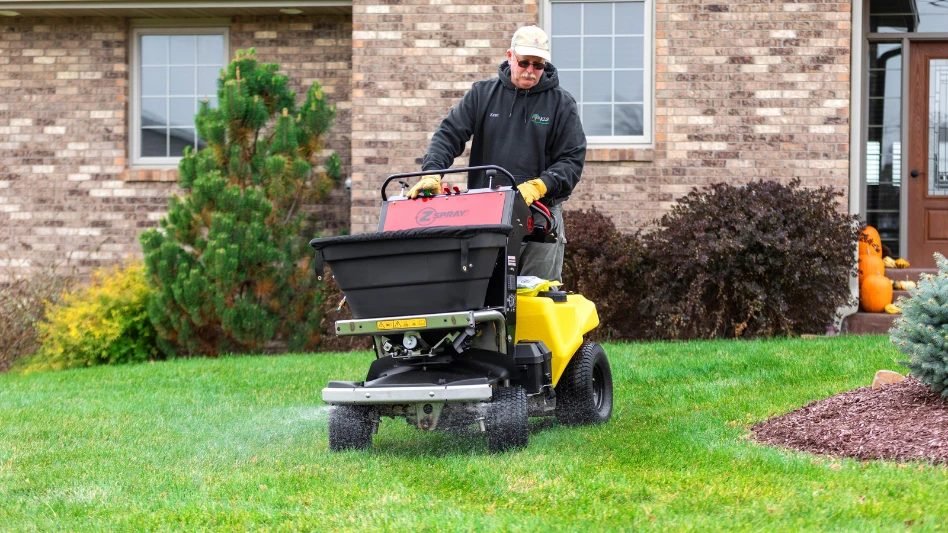


While many LCOs practice training year-round, the spring season can be especially busy and it’s easy to let things slip through the cracks. Still, contractors say that the beginning of the season is when training is most vital.
“It’s something I believe in. From a landscape company we pride ourselves in not just training. We put a lot of effort into safety training. When we spend time on training, it definitely equals out in the field,” says Scott Huvler, president of T.D. Landscape based in Fredericktown, Ohio. The company serves primarily commercial and government clients, offering landscape maintenance, installation, mowing, lawn care and more.
Training is so important in fact, Huvler says his company is in the process of developing their own program called T.D. Certified, which will include video and hands-on training. T.D. Landscape has 18 year-round employees and during peak season approximately 30 employees. The company has an annual revenue of $1.2 to $1.5 million.
When to bring in employees.
At Metropolitan Forestry Services, a tree and plant care company based just outside of St. Louis, Missouri, training happens year-round. In January and February, a lot of in-class and external training takes place, says Meggan Hargrave, president and owner.
About 25 people are employed by Metropolitan Forestry Services and the company has an annual revenue of $2.5 to $3 million.
Training is truly year-round at Dennis' 7 Dees, based in Portland, Oregon.
“There is a bit of a spring push, because we’ll end up hiring a few more people, but we don’t stop working. We’re hiring year-round so there is not an actual spring,” says Nathan Dirksen, chief operating officer. “We’re in the Portland area, we don’t have the complete shut down.”
The company operates seven retail garden centers. For the landscaping and design services, both commercial and residential customers are served. Approximately 275 employees work for the company during peak season and the company had an annual revenue of $33 million in 2018.
Even with year-round hiring, the whole company will still devote a special training time to recap the basics every year, Dirksen says.
“On the maintenance side, they’ll have that entire group gather up here mid-February and just kind of do a reminder, ‘Here’s how you do timecards. This is our plan for the year, for what we’re doing with this type of fungicide,’” Dirksen says.
Just before spring hits, training really gets underway, Huvler says.
“The bulk of it starts here after the first of the year,” he says. “We have a lot of site-specific training. In February, we have CPR and first aid training. Everyone in our company has to be first aid trained. We provide various classes for people to come in for that.”
Huvler’s team also undergoes mandatory utility protection services training. Around March 1, the team also trains for individual pieces of equipment such as mowers and trucks.
Special attention to new employees.
While ongoing training is vital for everyone, new hires typically receive specialized training.
“From the time that they start, they get an orientation, and the first couple weeks that they’re on are definitely a more training-heavy, more supervised type of situation,” Hargrave says.
Different companies handle verification of skills differently.
“If they say they can do something or if they have on their resume that they know how to do something, it’s more of kind of monitoring, seeing what they can do, make sure,” Hargrave says.
At Dennis' 7 Dees, a human resources manager will start by taking every new hire through an orientation process, Dirksen says.
“They go through the policies and procedures and handbook and just get real familiar with the company, and it’s a good couple of hours here,” Dirksen says. “And then they get handed off to whichever division and who they’re going to directly report to will take them, show them around the building, introduce them around the company and then get them lined up and set up for day one.”
When you spend time on training, it equals out in the field, says Scott Huvler, president of T.D. Landscape.
Pre-season training for all.
There are also basic trainings all employees must undergo regardless of their day-to-day duties, Hargrave says.
“There’s a baseline for what we require everybody to know to do: the chipper safety, the chainsaw safety, the groundsmen safety, just a general baseline for safe everyday operations,” Hargrave says.
Employees in more specialized roles, such as pesticide use, plant care or hazard communication will receive specialized training.
“Throughout the day, we try to emphasize people to ask a lot of questions and to be coaches of people, to be telling them why we’re doing things, why this is the way that it is and why we’re doing what we’re doing,” Hargrave says.
The training is collective, with anyone from crew leaders to sales managers participating, she says.
Making sure it sticks.
Finding opportunities to continually train and review is important, contractors say.
“On a daily basis, they’re having daily tailgate topics. So, every morning when everybody shows up for work, they’ll have a 10- to 15-minute conversation about a blower, how to run a chainsaw, how to properly load a truck, how to check the oil,” Dirksen says.
At T.D. Landscape, they have these conversations on at least a weekly basis.
“We do a weekly toolbox meeting. We go over a safety topic, fall protection, hands, wearing gloves … It’s just 10 minutes you go over some form of training,” Huvler says.
Similarly, managers are checking in weekly at Metropolitan Forestry Services, Hargrave says. Planning ahead helps.
“I think the planning part of it is huge, so having it set out so that you have something to train on,” Hargrave says. “Then just making time for it is huge, because it gets to that springtime when everything’s rushing.”
Management needs to believe in the training and follow it themselves without making it too boring, Huvler says.
“We also try to make the training fun. It used to be you brought in donuts. Now we found if you literally make breakfast for the guys and have some with it they get more out of it,” he says.
Get curated news on YOUR industry.
Enter your email to receive our newsletters.
Explore the February 2019 Issue
Check out more from this issue and find your next story to read.
Latest from Lawn & Landscape
- Grow your business with mosquito control
- LandCare adds 2 branches in SoCal, promotes Aleman to branch manager
- Spray them away
- PERC helps debut propane direct-injection fuel system at ACT Expo 2025
- Retargeting Ads – A Secret Weapon for Growing Your Lawn Care Business
- Leading a growing company
- Project EverGreen launches Clean Air Calculator
- Rain Bird acquires smart lawn care company OtO from Toronto






